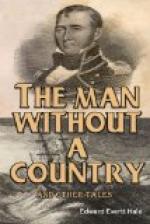With all these continuations, however, I have nothing to do. I can only repeat that my Philip Nolan is pure fiction. I cannot send his scrap-book to my friend who asks for it, because I have it not to send.
I remembered, when I was collecting material for my story, that in General Wilkinson’s galimatias, which he calls his “Memoirs,” is frequent reference to a business partner of his, of the name of Nolan, who, in the very beginning of this century, was killed in Texas. Whenever Wilkinson found himself in rather a deeper bog than usual, he used to justify himself by saying that he could not explain such or such a charge because “the papers referring to it were lost when Mr. Nolan was imprisoned in Texas.” Finding this mythical character in the mythical legends of a mythical time, I took the liberty to give him a cousin, rather more mythical, whose adventures should be on the seas. I had the impression that Wilkinson’s friend was named Stephen,—and as such I spoke of him in the early editions of this story. But long after this was printed, I found that the New Orleans paper was right in saying that the Texan hero was named Philip Nolan.
If I had forgotten him and his name, I can only say that Mr. Jefferson, who did not forget him, abandoned him and his,—when the Spanish Government murdered him and imprisoned his associates for life. I have done my best to repair my fault, and to recall to memory a brave man, by telling the story of his fate, in a book called “Philip Nolan’s Friends.” To the historical statements in that book the reader is referred. That the Texan Philip Nolan played an important, though forgotten, part in our national history, the reader will understand,—when I say that the terror of the Spanish Government, excited by his adventures, governed all their policy regarding Texas and Louisiana also, till the last territory was no longer their own.
If any reader considers the invention of a cousin too great a liberty to take in fiction, I venture to remind him that “’Tis sixty years since”; and that I should have the highest authority in literature even for much greater liberties taken with annals so far removed from our time.
A Boston paper, in noticing the story of “My Double,” contained in another part of this collection, said it was highly improbable. I have always agreed with that critic. I confess I have the same opinion of this story of Philip Nolan. It passes on ships which had no existence, is vouched for by officers who never lived. Its hero is in two or three places at the same time, under a process wholly impossible under any conceivable administration of affairs. When my friend, Mr. W.H. Reed, sent me from City Point, in Virginia, the record of the death of Philip Nolan, a negro from Louisiana, who died in the cause of his country in service in a colored regiment, I felt that he had done something to atone for the imagined guilt of the imagined namesake of his unfortunate god-father.




